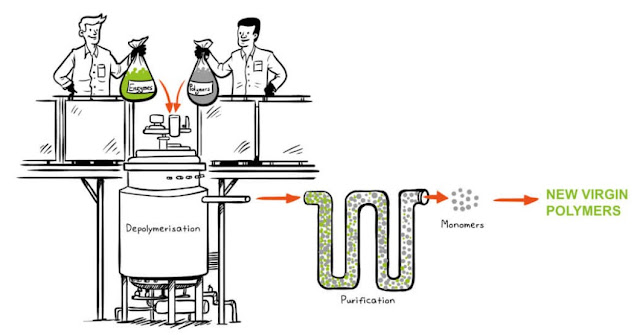Strong consortium will bring Carbios biological recycling technology to market on an industrial scale
Type of post: NEWS.
Carbios, a
green chemistry company founded in 2011, has developed two biological processes
for the breakdown and recycling of polymers in an attempt to reinvent their
lifecycle. Unlike currently used plastics recycling processes, which are
primarily thermo-mechanical, its recycling process is based on enzymes. Carbios
and L’Oréal founded a Consortium
to bring this enhanced recycling technology to market on an industrial scale in
October 2017. Committed to supporting sustainable development with innovative
solutions, Nestlé Waters, PepsiCo and Suntory Beverage &
Food Europe are joining the Consortium to promote the circular plastics
economy.
Press release: “Nestlé
Waters, PepsiCo and Suntory Beverage & Food Europe join consortium founded
by Carbios and L’Oréal to support the world’s first enzymatic technology for
the recycling of plastics”, 2/5/2019.
Under the terms of the four-year agreement, the
Consortium partners’ ambition is to bring Carbios’ PET-enhanced recycling
technology to the market and increase the availability of high-quality recycled
plastics to fulfil their sustainability commitments. The collaboration includes
technical milestones and support for the efficient supply of consumer-grade,
100% recycled PET plastics for global markets.
The enzymatic recycling
process
Carbios has developed an innovative process
that breaks down PET plastic waste into its original building blocks, which can
be used to produce high-quality PET plastic. This new approach enables the
specific de-polymerization of a single polymer. At the end of the first stage,
the monomer or monomers resulting from the de-polymerization process will be
purified, with the objective to re-polymerize them, thus enabling a recycling
process to infinity. Eventually, the plastic residues not degraded during the
first stage will be de-polymerized in the same way in a second stage by
applying a different enzyme that will de-polymerize other polymers in the same
way as in the first stage.
Figure 1. Carbios enzymatic biorecycling process
principle (taken from the website of the company)
This patented technology is marked by:
- Its potential to recycle PET plastics
repeatedly and rise the recycled PET content in new products (Carbios recently
achieved a world first using its enzymatic technology to create PET bottles
from 100% recycled plastics).
- Its ability to handle all forms of PET
plastics (clear, coloured, opaque and multilayer) and polyester fibres.
- A process at low temperature and pressure and
without solvents, which improves its environmental impact.
The enzymatic
biodegradation technology
Carbios is pioneering the use of enzymes to
degrade the polymers that make up plastic materials. This breakthrough
innovation involves embedding enzymes into plastic materials, thus enabling
them to fully biodegrade themselves with a controlled life span into base
molecules that can be assimilated by the microorganisms in nature.
Figure 2. Carbios “enzymated” plastics principle
(taken from company website)
Carbios founded the joint venture Carbiolice in
2016, in partnership with Limagrain Céréales Ingrédients and the SPI fund, run
by Bpifrance. This company will market the first technology licensed by Carbios
by producing enzyme pellets used in the manufacturing of biodegradable and
bio-sourced plastics. Carbiolice will target the markets of flexible films
(mulch films, bags and sacks, industrial films…) and rigid plastics (in the
field of agriculture and for disposable tableware). Theses biodegradable
plastics will meet the increasingly stringent requirements defined by France’s
energy transition law.






